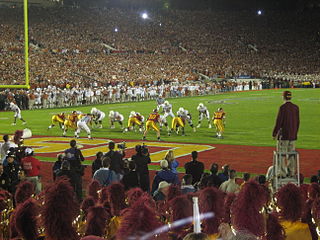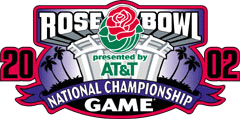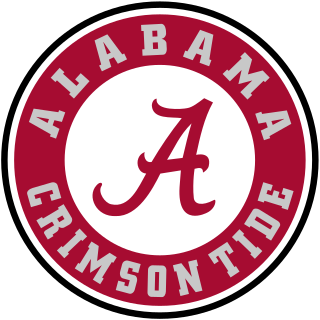Related Research Articles

The Rose Bowl Game is an annual American college football bowl game, usually played on January 1 at the Rose Bowl in Pasadena, California. When New Year's Day falls on a Sunday, the game is played on Monday, January 2. The Rose Bowl Game is nicknamed "The Granddaddy of Them All" because it is the oldest currently operating bowl game. It was first played in 1902 as the Tournament East–West football game, and has been played annually since 1916. Since 1945, it has been the highest attended college football bowl game. The game is a part of the Pasadena Tournament of Roses Association's "America's New Year Celebration", which also includes the historic Rose Parade. Winners of the game received the Leishman Trophy, named for former Tournament of Roses presidents, William L. Leishman and Lathrop K. Leishman who played an important part in the history of this game.

The Bowl Championship Series (BCS) was a selection system that created four or five bowl game match-ups involving eight or ten of the top ranked teams in the NCAA Division I Football Bowl Subdivision (FBS) of American college football, including an opportunity for the top two teams to compete in the BCS National Championship Game. The system was in place for the 1998 through 2013 seasons and in 2014 was replaced by the College Football Playoff.

In North America, a bowl game is one of a number of post-season college football games that are primarily played by teams belonging to the NCAA's Division I Football Bowl Subdivision (FBS). For most of its history, the Division I Bowl Subdivision had avoided using a playoff tournament to determine an annual national champion, which was instead traditionally determined by a vote of sports writers and other non-players. In place of such a playoff, various cities across the United States developed their own regional festivals featuring post-season college football games. Prior to 2002, bowl game statistics were not included in players' career totals. Despite attempts to establish a permanent system to determine the FBS national champion on the field, various bowl games continue to be held because of the vested economic interests entrenched in them.

The BCS National Championship Game, or BCS National Championship, was a postseason college football bowl game, used to determine a national champion of the NCAA Division I Football Bowl Subdivision (FBS), first played in the 1998 college football season as one of four designated bowl games, and beginning in the 2006 season as a standalone event rotated among the host sites of the aforementioned bowls.
The Associated Press poll provides weekly rankings of the top 25 NCAA teams in one of three Division I college sports: football, men's basketball and women's basketball. The rankings are compiled by polling 62 sportswriters and broadcasters from across the nation. Each voter provides their own ranking of the top 25 teams, and the individual rankings are then combined to produce the national ranking by giving a team 25 points for a first place vote, 24 for a second place vote, and so on down to 1 point for a twenty-fifth place vote. Ballots of the voting members in the AP poll are made public.
A mythical national championship is national championship recognition that is not explicitly competitive. This phrase has often been invoked in reference to American college football, because the NCAA does not sponsor a playoff-style tournament or recognize official national champions for the Football Bowl Subdivision. The relevant recognition before 1998 came from various entities, including coach polls and media ballots, which each voted to recognize their own national champions, and is similar to the newspaper decision used in early boxing matches. The contrary term would be an undisputed national championship.

The 2004 Texas Longhorns football team represented the University of Texas at Austin in the 2004 NCAA Division I-A football season. The team was coached by head football coach Mack Brown and led on the field by quarterback Vince Young. Ranked third in wins in Division I-A college football history, the University of Texas has traditionally been considered a college football powerhouse, but Brown had not managed to lead the Longhorns into a Bowl Championship Series (BCS) game. The 2004 season included some controversy related to the selection of Texas as an at-large team to attend the 2005 Rose Bowl. Brown coached the team to win that game with a thrilling last-second victory. The victory brought the Longhorns to 11 wins and 1 loss for the season (11–1) and it earned the Longhorns a top 5 finish in the polls.
The Coaches Poll is a weekly ranking of the top 25 NCAA Division I Football Bowl Subdivision (FBS) college football, Division I college basketball, and Division I college baseball teams. The football version of the poll has been known officially as the Amway Coaches Poll since 2014.

The 2002 Rose Bowl, played on January 3, 2002, was a college football bowl game. It was the 88th Rose Bowl game and was the BCS National Championship Game of the 2001 college football season. The game featured the Miami Hurricanes and the Nebraska Cornhuskers, marking the first time since the 1919 Rose Bowl, and only the third time in the game's history, that neither the Big Ten nor the Pac-10 Conferences had a representative in this game. The Hurricanes won the game, 37–14, for their fifth national title. Miami quarterback Ken Dorsey and wide receiver Andre Johnson were named the Rose Bowl Players of the Game.

The 1999 Florida State Seminoles football team represented Florida State University during the college football season of 1999. Winning the Atlantic Coast Conference (ACC) Championship and winning the 2000 Sugar Bowl BCS National Championship game, the team was coached by Bobby Bowden and played their home games at Doak Campbell Stadium. The team entered the season with high expectations after losing to Tennessee in the inaugural BCS Championship game. FSU entered the 1999 pre-season ranked No. 1 in all national pre-season polls, picked unanimously to win the ACC and expected to contend for a national championship. The Seminoles finished 11–2 in 1998, extending their NCAA record to 13 straight seasons with at least 10 victories and ranked among the nation's top four teams.
The Bowl Championship Series (BCS) was a selection system used between 1998 and 2013 that was designed, through polls and computer statistics, to determine a No. 1 and No. 2 ranked team in the NCAA Division I Football Bowl Subdivision (FBS). After the final polls, the two top teams were chosen to play in the BCS National Championship Game which determined the BCS national champion team, but not the champion team for independent voting systems. This format was intended to be "bowl-centered" rather than a traditional playoff system, since numerous FBS Conferences had expressed their unwillingness to participate in a play-off system. However, due to the unique and often esoteric nature of the BCS format, there had been controversy as to which two teams should play for the national championship and which teams should play in the four other BCS bowl games. In this selection process, the BCS was often criticized for conference favoritism, its inequality of access for teams in non-Automatic Qualifying (non-AQ) Conferences, and perceived monopolistic, "profit-centered" motives. In terms of this last concern, Congress explored the possibility on more than one occasion of holding hearings to determine the legality of the BCS under the terms of the Sherman Anti-Trust Act, and the United States Justice Department also periodically announced interest in investigating the BCS for similar reasons.

A national championship in the highest level of college football in the United States, currently the NCAA Division I Football Bowl Subdivision (FBS), is a designation awarded annually by various organizations to their selection of the best college football team. Division I FBS football is the only National Collegiate Athletic Association (NCAA) sport for which the NCAA does not sanction a yearly championship event. As such, it is sometimes unofficially referred to as a "mythical national championship".

The College Football Playoff (CFP) is an annual postseason knockout invitational tournament to determine a national champion for the National Collegiate Athletic Association (NCAA) Division I Football Bowl Subdivision (FBS), the highest level of college football competition in the United States. Four teams play in two semifinal games, and the winner of each semifinal advances to the College Football Playoff National Championship game.

Two human polls and a committee's selections comprised the 2016 National Collegiate Athletic Association (NCAA) Division I Football Bowl Subdivision (FBS) football rankings, in addition to various publications' preseason polls. Unlike most sports, college football's governing body, the NCAA, does not bestow a national championship, instead that title is bestowed by one or more different polling agencies. There are two main weekly polls that began in the preseason—the AP Poll and the Coaches Poll. One additional poll was released midway through the season; the College Football Playoff (CFP) rankings are released after the eighth week.
The Colley Matrix is a computer-generated sports rating system designed by Dr. Wesley Colley. It is one of more than 40 polls, rankings, and formulas recognized by the NCAA in its list of national champion selectors in college football. Though it was created in 1998, its retroactive selections since 1992 are recognized by the NCAA.

Two human polls and a committee's selections comprise the 2020 National Collegiate Athletic Association (NCAA) Division I Football Bowl Subdivision (FBS) football rankings, in addition to various publications' preseason polls. Unlike most sports, college football's governing body, the NCAA, does not bestow a national championship at the FBS level. Instead, that title is bestowed by one or more different polling agencies. There are two main weekly polls that begin in the preseason—the AP Poll and the Coaches Poll. One additional poll, the College Football Playoff (CFP) ranking, is usually released starting midway through the season. The CFP rankings determine who makes the four-team playoff that determines the College Football Playoff National Champion. Due to scheduling impact from the COVID-19 pandemic, release of CFP rankings during the 2020 season was adjusted to have the first rankings issued on November 24 and the final rankings issued on December 20.

The 2020 Alabama Crimson Tide football team represented the University of Alabama in the 2020 NCAA Division I FBS football season. This was the Crimson Tide's 126th overall season, 87th as a member of the Southeastern Conference (SEC), and 29th within the SEC Western Division. They played their home games at Bryant–Denny Stadium in Tuscaloosa, Alabama, and were led by 14th-year head coach Nick Saban.

Two human polls and a committee's selections comprise the 2021 National Collegiate Athletic Association (NCAA) Division I Football Bowl Subdivision (FBS) football rankings, in addition to various publications' preseason polls. Unlike most sports, college football's governing body, the NCAA, does not bestow a national championship at the FBS level. Instead, that title is bestowed by one or more different polling agencies. There are two main weekly polls that begin in the preseason—the AP Poll and the Coaches Poll. One additional poll, the College Football Playoff (CFP) ranking, is usually released starting midway through the season. The CFP rankings determine who makes the four-team playoff that determines the College Football Playoff National Champion.

Two human polls and a committee's selections comprise the 2022 National Collegiate Athletic Association (NCAA) Division I Football Bowl Subdivision (FBS) football rankings, in addition to various publications' preseason polls. Unlike most sports, college football's governing body, the NCAA, does not bestow a national championship at the FBS level. Instead, that title is bestowed by one or more different polling agencies. There are two main weekly polls that begin in the preseason—the AP Poll and the Coaches Poll. One additional poll, the College Football Playoff (CFP) ranking, is usually released starting midway through the season. The CFP rankings determine who makes the four-team playoff that determines the College Football Playoff National Champion.
The 2023 NCAA Division I FBS football season will be the 154th season of college football in the United States organized by the National Collegiate Athletic Association (NCAA) at its highest level of competition, the Football Bowl Subdivision (FBS). The regular season will begin on August 26 and end on December 9. The postseason will begin on December 15, and, aside from any all-star games that are scheduled, end on January 8, 2024, with the College Football Playoff National Championship at NRG Stadium in Houston, Texas. This will be the tenth and final season of using the four team College Football Playoff (CFP) system, with the bracket expansion set for 12 teams for the 2024 season.
References
- ↑ Luber, Isaac. "Let's Face It, The AP College Football Poll Sucks and Is Completely Biased". Bleacher Report. Retrieved 8 November 2008.
- ↑ Hodges, Jonathan. "Please, Just Eliminate the Coaches' Poll". Bleacher Report. Retrieved 21 November 2014.
- ↑ Solomon, Jon. "BCS' biggest controversies: Split champions, Auburn 2004, Alabama-LSU rematch & more (poll)". AL.com. Retrieved 10 May 2019.
- 1 2 Kaipust, Rich (21 May 2013). "Osborne plugs 'Legends' voters to be part of playoff selection process" . Retrieved 2 November 2020.
- ↑ Ferrante, Bob (7 April 2012). "Bobby Bowden to vote in weekly poll, helps him stay connected to college football". Palm Beach Post. Retrieved 2 November 2020.
- 1 2 Feldman, Bruce. "Legends Poll the most viable selection route?". CBS Sports. Retrieved 23 December 2021.
- 1 2 Feldman, Bruce (13 May 2013). "Legends Poll the most viable selection route?". CBS Sports. Retrieved 2 November 2020.
- ↑ McMurphy, Brett. "Parameters for selectors in place". ESPN. ESPN. Retrieved 10 August 2013.
- ↑ "Phil Fulmer eyes selection committee". ESPN. Retrieved 10 August 2013.
- ↑ Uthman, Daniel. "Meet the College Football Playoff selection committee". USA Today. Retrieved 20 November 2020.
- ↑ Trahan, Kevin. "Tommy Bowden does not think Condoleezza Rice should be on the College Football Playoff committee". SB Nation. Retrieved 27 October 2014.
- ↑ Chi, Samuel. "Is College Football Playoff Committee Losing Its Legitimacy?". The Post Game. Retrieved 1 December 2016.
- ↑ Dodd, Dennis. "Flimsy recusal policy puts bull's-eye on playoff selection committee". CBS. Retrieved 30 November 2018.
- ↑ Kirk, Jason. "9 potential problems with the College Football Playoff selection committee". SB Nation. Retrieved 22 December 2014.